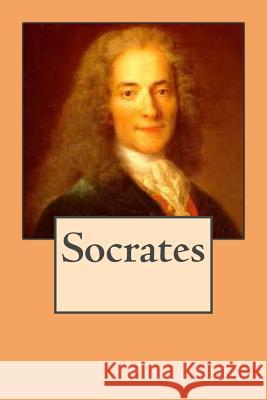Socrates » książka
Socrates
ISBN-13: 9781541306547 / Angielski / Miękka / 2016 / 50 str.
Francois-Marie Arouet, known as Voltaire, born November 21, 1694 in Paris, where he died May 30, 1778 (aged 83) is a French writer and philosopher who marked the eighteenth century and occupies a special place in French collective memory and internationally. An emblematic figure of the Enlightenment, leader of the philosophical party, his name remains attached to his fight against religious fanaticism, which he calls the "Infamous" for tolerance and freedom of thought. Anticlerical and deist outside organized religion, its political objective is that of a moderate and liberal monarchy, enlightened by the "philosophers." Committed intellectual in the service of truth and justice, he shall, later on, alone and in using his immense fame, defending victims of religious intolerance and arbitrariness in cases that he made famous: Jean Calas, Pierre-Paul Sirven, Chevalier de la Barre, Count Lally. His literary work is varied: its theater, its epic, historical works, made him one of the most famous French writers in the eighteenth century but it also includes stories and novels, philosophical Letters, the Philosophical Dictionary and important correspondence, more than 21 000 letters found. Throughout his life, Voltaire attended the Great and woos monarchs not hide his disdain for the people, but it is also exposed to the interventions of power, that the Bastille and forced into exile in England or away from Paris. In 1749, after the death of Emilie du Chatelet, with which he has had a stormy liaison for fifteen years, he moved to the Prussian court but, disappointed in his hopes to play a large role with Frederick II in Berlin, is quarreled with him after three years and left Berlin in 1753. He fled later to Delices, near Geneva, in 1759 before acquiring a domain in Ferney, on the French-Geneva border, away from strong . It will return to Paris in 1778, cheered by the people after an absence of almost twenty-eight years. He died aged 83. Voltaire like comfort, the pleasures of the table and the conversation he believes, with the theater, as one of the most successful forms of life in society. Anxious to his material wealth, which guarantees their freedom and independence, he acquired a considerable fortune in speculative operations that prefigure major stock speculation under Louis XVI and in the sale of his books, allowing him to move in 1759 the castle of Ferney and live on a big foot there, holding table and door open. The pilgrimage to Ferney in 1770-1775 is part of the training journey of enlightened European elite. Investing its capital, it is the miserable village of Ferney a successful small town. Generous, with cheerful mood, it is nevertheless argumentative and sometimes fierce and mean with his opponents like Jean-Jacques Rousseau or Crebillon1. Considered by the French Revolution - Jean-Jacques Rousseau, his enemy brother - as a precursor, he entered the Hall in 1791, the second after Mirabeau. At the same time, on the initiative of the Marquis de Villette, who hosted the "dock Theatine" where the writer lived in Paris at the time of his death will be called "quai Voltaire." Celebrated by the Third Republic (in 1870, in Paris, a boulevard and a place bear his name), he fed the nineteenth century, antagonistic passions of opponents and defenders of state secularism and school public, and, beyond, the spirit of the Enlightenment."
Zawartość książki może nie spełniać oczekiwań – reklamacje nie obejmują treści, która mogła nie być redakcyjnie ani merytorycznie opracowana.











